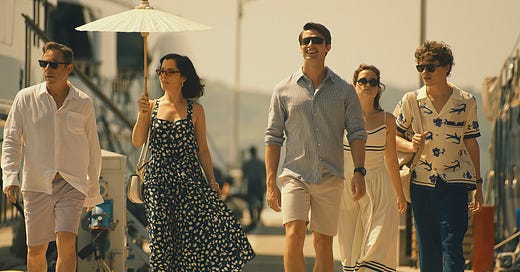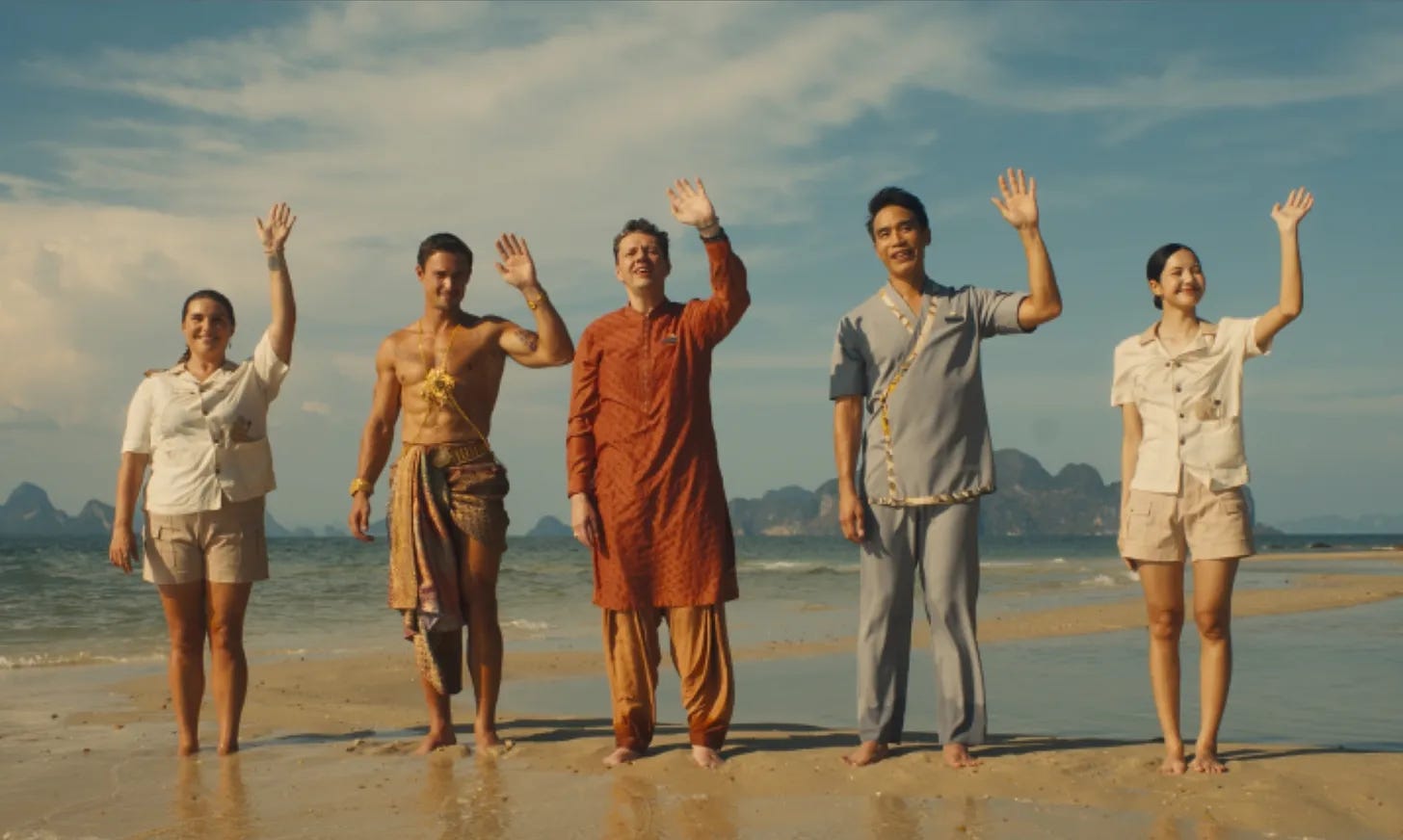Spoilers ahead for The White Lotus S1-3
They say you can learn a lot about somebody by going on vacation with them. And I’d posit that you can learn the most not by traversing Old World streets or hiking up to Machu Picchu, but by laying by the pool with them for seven days straight. Taking three square meals with them at the same hotel restaurant. Getting massages and pedicures and endless beachside drinks side-by-side. You can learn the most about someone in their idle moments, and a resort vacation is effectively one big moment of indolence. One big exercise in trying to deter thoughts of work or relationships or existentialism. An experiment in which one tries to swim against the heavy-flowing stream of productivity culture to “recharge” so they can sustain their output.
Those with the privilege to take such vacations often struggle to do so. Like a meditating mind that can’t seem to quiet its own chatter, the real grime flows to the surface as soon as you’re at rest. You’re settled in your beach chair with your book, but your eyes glance over the words without reading them. You find yourself reading the same page again and again. You find yourself paranoid and easily upset - at yourself, at your travel companions, at people in a different time zone than you, at shadows. Arguments ensue, tears flow, and in the case of The White Lotus, blood sheds.
This is what caused the acclaimed HBO show to take off in popularity so acutely. Season one of The White Lotus captured the anxieties found in rich, high-power (and insane) white Americans trying to take rest, while the service people at their disposal scramble to keep them relaxed, often at their own expense. The White Lotus, in part, kicked off the trend of popular media criticizing rich people. This phenomenon began with Bong Joon-ho’s masterpiece Parasite winning the Academy Award for Best Picture in 2020 and continued with more contrived interpretations like Triangle of Sadness (2022), the Knives Out sequel (2022), The Menu (2022), and more recently, Zoë Kravitz’s Blink Twice (2024).
The White Lotus stood out among the pack because its characters occupied both highly specific and universally recognized niches. The high-power mother CEO who’s expected to kick ass and take names while also uplifting other women. The white daughter and her woke friend from university, freshly enlightened from a liberal arts education, schooling her liberal parents for their political incorrectness. The entitled ex-frat bro turned finance guy who doesn’t understand why his journalist fiancé still wants to work when she’s marrying into money. And the loony, medicated middle-aged woman, rich off a mysterious fortune, traveling under the pretext of “healing” and “reconnecting.” All of this set along the fertile backdrop of Maui, Hawaii - a locale with a violent colonial history, glossed over with five-star resorts and coconut pancakes - alongside service workers with just as rich backstories. A high-strung hotel manager, a woman hiding her pregnancy so she can continue to work for pay, a young man coaxed into stealing from tourists, and so on.
The first season wrote its characters smartly. And with just the right amount of internet language - enough to make the show feel young and current but not so much that it would remain arrested in time. The season’s themes centered on exploitation of land, friends, family, and service workers, which played well into its island resort setting. The White Lotus became lauded, entering the canon of excellent HBO programming. The first season was nominated for eleven Emmys and won ten.
The show was originally intended to be a six-episode limited series, so when a second season was announced, I was nervous that it would falter. Worried that it would be a clumsy reproduction of the same themes, a mere money grab. But it soared. Season two, set in Sicily, played into the particulars of its Italian setting - grappling with themes of paramours, love, sexuality, generational trauma, traditional gender roles, and so on. Season two secured five more Emmys, with fans itching with excitement to see what would come next.
When I learned that season three was set in Thailand, it seemed like a perfect fit. A new continent for The White Lotus - the furthest East it's gone. Thailand is the perfect playground for rich white people to make fools of themselves, with the West’s tendency to fetishize Eastern medicine, ogle over sex tourism, and appropriate Buddhist culture. White ladies with Namaste, bitches t-shirts, tech bros traveling to optimize their wellness routines, a whole lot of “holistic healing” - the opportunities were endless. What I was expecting was Lorde’s song “Mood Ring” turned into a TV show. What I’m receiving is, well, not quite that.
Mike White, creator of The White Lotus, has furnished season three with all of his usual archetypes. Spoiled rotten white family. Entitled ex-frat bro. Know-it-all older sister. Loser little brother. Highly medicated, gag-worthy white lady with clever one-liners (formerly Jennifer Coolidge, now Parker Posey). An age-gap/wealth-gap relationship. And some peculiar but well-meaning service workers. But they’re not quite hitting like they used to.
It’s not exactly that these characters feel like regurgitations of past seasons so much as they feel shallowly written. Something that I loved about season two was the subtlety with which the characters spoke about themselves and their relationships. Season two’s Daphne, played by Meghann Fahy, spun a subtle yarn, quietly spelling out her having an affair without even needing to state it explicitly. Her eyes, her gestures, her careful diction, dancing around the truth - it all spoke for itself.
In season three, the dialogue is so painfully transparent - there’s no room for viewers to color in between the lines with the versions of these people from their own lives. “Oh I don’t need a vacation, I love working,” says Saxon, the token “grindset” finance bro of the season. We know that just from looking at him - from the polo, khakis, and sports sunglasses dangling from his neck. The trio of white women friends - Jaclyn and Kate are rich, married, and Botoxed, and Laurie is an overworked divorcée - so explicitly state their opinions behind the others’ backs. Kate remarks on how “defeated” Laurie looks right after saying she looks great. “I thought you said she looked great,” Jaclyn comments mischievously - she did, and we all caught it. The writers assume too little of their audience, and maybe it’s for good reason.
The White Lotus has become best known for its one-liners turned memes turned bootleg merch. In season two, before her demise, Coolidge’s character declares, “These gays are trying to murder me.” Since then, I’ve seen this phrase reproduced on hats, t-shirts, and Evan Ross Katz’s Instagram copiously. Same with Haley Lu Richardson’s character’s iconic “Yeah? So you fuck your uncle?” In season three, it seems as though The White Lotus is in hot pursuit of more viral quotations, and the writing and line delivery reflect that. The season’s characters almost take a beat before uttering their nonsensically goofy line to make sure audiences have enough to jot it down for their Etsy imitations. Kate’s “One day I decided to trick my mind into loving beans, and now I do,” Chelsea’s “It’s good to talk about things with a wise Indian,” Rick’s “Weed helps,” and so on - the dialogue feels written and performed not for a critical audience, but for TikTok.
Perhaps the virality of The White Lotus is, in part, what’s making it lose its allure. Given the influx of replications of the same plotline and characters, the “eat the rich” storyline is also beginning to lose its lustre. When the show first premiered, it seemed to touch on global wealth inequality and liberal virtue-signaling in a way that felt nuanced, elevated, and incredibly amusing.
Now it feels as though the show is telling us something we all painfully know: this world is run by out-of-touch oligarchs (bro-ligarchs, in the case of the United States) who remain apathetic, even when they publicly wax “liberal.” Like “the patriarchy” or “capitalism,” “eat the rich” has now entered the catalogue of terms and phrases once helpful for identifying and correcting social issues that’s now flattened thanks to overconsumption and misuse on and off the internet. “Eat the rich” once signified the expansive financial chasm in America and the need for wealth distribution. Now, it’s a phrase strewn across Met Gala outfits and mugs at coffee shops in neighborhoods undergoing gentrification. It’s a safe phrase - one you can weave into your vocabulary to evoke class consciousness. It’s lost its subversion, and as such, so has The White Lotus.
If The White Lotus wants to retain its identity as an HBO Darling, it needs to continue moving its goalpost. The show won’t achieve this by giving us more of the same or by leaning more obvious or melodramatic (the hotel robbery in S3 E2 had me yawning). The show instead needs to lean into the particulars of each season’s location and assume more of its audience. Challenge its audience even. If The White Lotus and its cohorts could get a good swathe of young Americans licking their lips at the mega-wealthy, perhaps it can hone the public’s attention elsewhere or at least sharpen its current focus. Now’s certainly a better time than ever for it.








Three episodes in and I think it's too early to call. I say let Mike White cook. I notice that it's less-verbose that previous seasons and allows more pauses and reactions. Rewatching Steve Zahn and Plop in S1 is a little painful, they have too many lines.
Also it's worth noting that the degree of difficulty in keeping five storylines (Carolingians, Cougars, Goggins, Belinda, Thais) going is higher, and will naturally lead to less character development on a per-case basis.
I'm also not in full-apologist mode either, just wanting to suspend judgement until the end.
couldn’t agree more— the characters are such let downs this season, making it a total snoozefest. after watching the first episode, i asked my husband if it was just super boring or if i missed the point and should watch again. result: did not watch again. the next episode did nothing to help. love your point about it basically just being too on the nose right to be interesting.